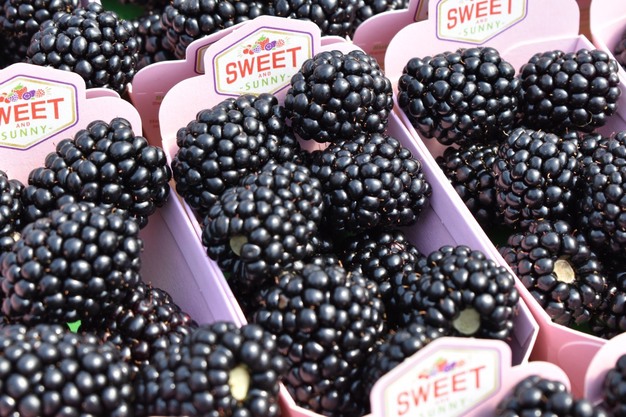Blackberries are generally recognised as the smallest player of the four main berry segments. In fact, statistics bear this out and despite there having been almost a doubling in global production of fresh blackberries over the past two decades, the crop still has significant growth opportunities. In most developed global markets, fresh blackberry sales account for 5-10% of the overall berry category, again suggesting room for much greater growth.
One of the buzz phrases in the berry industry over recent years has been “better-tasting blackberries”. This term is attributed to a small number of varieties that can now be found on retailer shelves and that have taken significant market share from traditional cultivars. Many people associate blackberries with a “tangy” flavour that is a result of elevated acidity levels within the berries of these traditional types. The better tasting varieties either have higher levels of sweetness (Brix), lower acidity or both when compared to older cultivars, or indeed wild types of bramble from hedgerows.

The aim of these better tasting blackberries is to deliver an improved eating experience to the consumer and lead to more regular purchasing within the household. Now that we have a number of these varieties available to the industry, there is real opportunity for significant growth in the consumption and therefore production of blackberries. The average annual global increase in blackberry production from 2000 to 2020 was was 3.4%. The proliferation of improved eating varieties could mean that we will see this growth dramatically increase in the next 5-10 years.
At GPG, we are excited to be playing our part in this improvement in the eating quality of blackberries with our variety, Von. Bred at NCSU by Dr. Gina Fernandez, Von blackberry was selected for a range of improved characteristics, including taste, yield, quality, size and shelf-life. Since that stage, Von has been tested and now grown on a commercial scale by growers around the globe.
One of the first proponents of the commercial production of Von for the supply of fresh blackberries to retailers was The Greenery in the Netherlands. The Greenery has an exclusive licence from GPG for Von blackberry production in the Benelux countries. Since their initial tests with the variety where its development potential was first identified, they have put in a huge amount of technical development work with Von. This has led to increased yields over a longer season of supply and the variety is marketed under the company's premium brand “Sweet and Sunny”. This branding is testament to Von's excellent flavour and long shelf life.
Together with The Greenery, GPG hosted two Von Blackberry open days. The open days had two main areas of focus; nursery production of young plants and long canes as well as commercial fruit production. Further, we were able to take in the latest trials with Von blackberry at Delphy. As with all berry fruit production, it is important to start plantations with high quality plant material. The Von blackberry has shown that it is well adapted to production from frozen long canes. One of the major benefits of this production system is that it extends the potential season of supply from a natural 4-6 weeks up to 6 months or more from the same climatic and growing conditions. As a result, using a combination of warm and temperate climates in the same Continent can mean a full 12-month supply of excellent quality Von blackberries.
Those attending the open days were from varying sectors of the blackberry industry and included growers, nurseries, fruit marketing businesses, consultants and researchers. By joining the programmes, each group was able to gain great knowledge of Von and which production methods to employ in order to maximize its potential on a global scale.
One attendee, Rolando Garcia, Co-Founder and Research Director at SynergiaBio in Chile and Mexico, commented, “it was very encouraging to look at the Von variety in close detail and to see the great productivity of the variety, its calibre and large size as well as excellent flavour. Having previously seen Von in South Africa last year, I knew that I liked it but a better understanding of the long cane growing system will enable me to benefit important producers in some of my growing regions too.”
Klaas de Jager, Soft Fruit Innovation Manager at The Greenery stated, “having worked with Von for more than five years now both in trials and more recently, commercial scale production, we are convinced that it offers genuine advantages both to our grower base and retail customers. Von presents its fruit extremely well and from this, we are seeing harvesting costs reduced by around 30% compared to previous varieties grown in the same production system. Its improved flavour and shelf life also mean that we can offer Von in our premium brand “Sweet and Sunny”, delivering a better eating experience for the final consumer.”
Jamie Petchell of GPG said, “Von is certainly at the vanguard of improved eating quality blackberries. We are excited at the prospect of it playing an important role in the growth of the blackberry category on a global scale. For too long, consumers have experienced an inconsistent varietal offer but we are genuinely seeing this reducing quickly as growers and fruit marketing businesses continue to offer better varieties. We have now licensed Von with growers and nurseries in a wide range of growing locations globally and it will be great to see its production continue to increase in the next few years.”
For more information:
Global Plant Genetics
Tel: +44 (0) 1485 210091
Email: [email protected]
https://www.globalplantgenetics.com/
